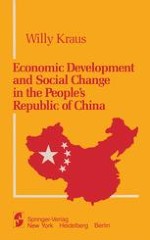It is a pleasant task to welcome the appearance of the American edition of Professor Willy Kraus' valuable work on the economic and social development of the People's Republic of China, first published in German in 1979. The book has been updated in the light of the events that have occurred since the original publication and incorporates the latest statistical information made available by the Chinese authorities with unaccus tomed liberality. The American edition, like its German predecessor, is a monumental achievement of scholarship, attractively presented. In its comprehensiveness, insight, professionalism and wisdom it ranks among the best studies of the subject. It will add to the knowledge of the specialist, and help the interested layman find his way through the complexities of contemporary China's socioeconomic system. Professor Kraus' work is a most timely and welcome addition to a better and more thorough understanding of an absorbing and important subject. June 1982 Jan S. Prybyla Professor of Economics The Pennsylvania State University University Park, Pennsylvania Preface This book deals with China's development policies. It is based on the original German edition (1979), "Wirtschaftliche Entwicklung und sozialer Wandel in der Volksrepublik China," but is not merely a translation of the German original. The rapid changes in Chinese policy within the last two years, together with a sudden deluge of official data on economic and social developments in the People's Republic of China, have called for a basic and comprehensive revision of text and statistics.
